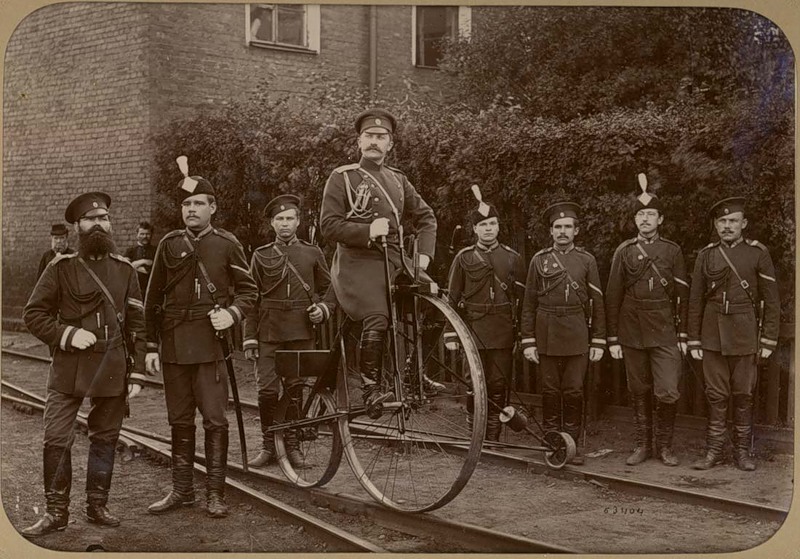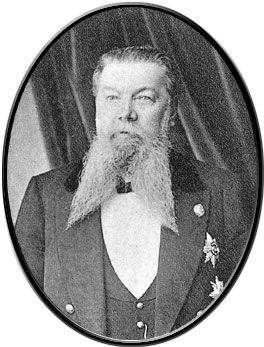|
Vyacheslav Von Plehve
Vyacheslav Konstantinovich von Plehve ( rus, Вячесла́в Константи́нович фон Пле́ве, p=vʲɪtɕɪˈslaf kənstɐnʲˈtʲinəvʲɪtɕ fɐn ˈplʲevʲɪ; – ) was a Russian politician who served as the director of the police from 1881 to 1884 and later as the minister of the interior from 1902 until his assassination in 1904. Biography Born in Meshchovsk, Kaluga Governorate, Russia, on 20 April 1846, Plehve was the only son of schoolteacher Konstantin von Plehve and Elizaveta Mikhailovna Shamaev, daughter of a minor landowner. In 1851, Plehve's family moved from Meshchovsk to Warsaw in Russian-controlled Congress Poland, where his father accepted a job as an instructor in a gymnasium. After studying law at Moscow University, he joined the Ministry of Justice in 1867. He served as assistant prosecutor in the Vladimir circuit court and as a prosecutor in Vologda. In 1876, he was appointed assistant prosecutor of the Warsaw Chamber of Jus ... [...More Info...] [...Related Items...] OR: [Wikipedia] [Google] [Baidu] |
Ministry Of Internal Affairs Of The Russian Empire
The Ministry of Internal Affairs of the Russian Empire () was the state executive authority of the Council of Ministers of the Russian Empire, which carried out administrative functions in the areas of state security, public security, law enforcement, leadership of local authorities, the fight against crime, protection of places of deprivation of liberty, the licensing system, and censorship in media and book publishing. The Ministry of Internal Affairs of the Russian Empire concentrated in its hands a wide variety of tasks, both of the security police and the welfare police. History On, , the manifesto published by Alexander I named “On the establishment of ministries” was approved. Along with others ministries, the Russian Ministry of Internal Affairs was also created. The first Minister of Internal Affairs was Count Viktor Kochubey. The Deputy Minister became Count Pavel Stroganov. According to Count Speransky, the ministry should have been in charge of the country ... [...More Info...] [...Related Items...] OR: [Wikipedia] [Google] [Baidu] |
Sergei Vasilyevich Zubatov
Sergei Vasilyevich Zubatov ( rus, Серге́й Васи́льевич Зуба́тов, p=zʊˈbatəf; April 7 O.S. 1864 – March 15, 1917) was a Russian Empire police Administration (government)">administrator, best known as the advocate of "police socialism", which included creating legal, police-controlled trade unions. Biography Born in Moscow as the son of a police chief, Sergei Zubatov became involved in revolutionary circles as a schoolboy and was expelled at the age of 16 at his father's instigation. His father also made him marry an army officer's daughter, , in the hope that marriage would keep him out of trouble. Instead, the couple ran a bookshop that became a gathering place for revolutionaries. In 1886, if not earlier, he was persuaded by N. S. Berdyaev, the head of the Moscow Okhrana, the department responsible for suppressing the revolutionary movement, to become an informant, under the threat of expulsion from Moscow. Information that he passed to the police led ... [...More Info...] [...Related Items...] OR: [Wikipedia] [Google] [Baidu] |
Zemstvo
A zemstvo (, , , ''zemstva'') was an institution of local government set up in consequence of the emancipation reform of 1861 of Imperial Russia by Emperor Alexander II of Russia. Nikolay Milyutin elaborated the idea of the zemstvo, and the first zemstvo laws went into effect in 1864. After the October Revolution of 1917 the zemstvo system was shut down by the Bolsheviks and replaced with a multilevel system of workers' and peasants' councils ("soviets"). History Zemstvos were created as part of the larger Great Reforms with the specific goal of creating organs of elected, local self-government. The existing system of local self-government in the Russian Empire was represented at the lowest level by the mir and at the regional level by the volost. These institutions continued during the zemstvo period; however, they were seen as insufficient, due to their lack of independent authority. In 1864, the first law on zemstvos was enacted by the Emperor, a law that outlined the p ... [...More Info...] [...Related Items...] OR: [Wikipedia] [Google] [Baidu] |
Special Corps Of Gendarmes
The Separate Corps of Gendarmes () was the uniformed security police of the Imperial Russian Army in the Russian Empire during the 19th and early 20th centuries. Its main responsibilities were law enforcement and state security. The responsibilities of the Gendarmes also included the execution of court orders, pursuit of fugitives, riot control, and detainment of "unusual" criminals. Gendarmes could also be assigned to assist local police and officials. Establishment The precursors of the Corps were the Imperial Army Gendarmerie regiment (formed in 1815 and based on the Borisoglebsk Dragoon Regiment) and Gendarmerie units of the Separate Corps of the Internal Guards (raised 1811). Following the 1825 Decembrist revolt, the new Russian Emperor, Nicholas I, established the office of the Chief of Gendarmes in July 1826 and appointed General Count Alexander Benkendorf to it; all of the gendarmes were subordinate to the Chief. Benkendorf was also appointed executive director ... [...More Info...] [...Related Items...] OR: [Wikipedia] [Google] [Baidu] |
List Of Interior Ministers Of Russia
This is a list of Minister of Internal Affairs (Russia), ministers of internal affairs of Russia. Russian Empire Provisional Government/Russian Republic Russian SFSR 1917–1930 1955–1966 1989–1992 Russian Federation Timeline See also * Ministry of Internal Affairs (Russia), Ministry of Internal Affairs * Russian Council of Ministers * Ministry of Police of Imperial Russia External links *Ministers of Imperial Russia {{Ministers of Internal Affairs (Russia) Ministers of internal affairs of Russia, *Lists Lists of government ministers of the Russian Empire, Interior Lists of government ministers of Russia Lists of government ministers of the Soviet Union ... [...More Info...] [...Related Items...] OR: [Wikipedia] [Google] [Baidu] |
Dmitry Sipyagin
Dmitry Sergeyevich Sipyagin (; – ) was a Russian politician. Political career Born in Kiev, Sipyagin graduated from the Judicial Department of St Petersburg University in 1876. Served in the MVD as Vice Governor of Kharkov Governorate (1886–1888), Governor of Courland Governorate (1888–1891) and Governor of Moscow Governorate (1891–1893). Deputy of the Minister of State Property (1893); Deputy of the Minister of Interior (1894); Executive Director on the petitions of the Imperial Chancellery (1895–1899); Director of the Ministry of Interior An interior ministry or ministry of the interior (also called ministry of home affairs or ministry of internal affairs) is a government department that is responsible for domestic policy, public security and law enforcement. In some states, th ... (1899); Minister of Interior (1899). In 1899, during the Russian Student Strike, the government had given Sipyagin "the power of imposing military service as a punishment f ... [...More Info...] [...Related Items...] OR: [Wikipedia] [Google] [Baidu] |
Military Of The Grand Duchy Of Finland
Between 1809 and 1917, Finland was an autonomous part of the Russian Empire as the Grand Duchy of Finland. Between 1881 and 1901, the grand duchy had its own army. Before that, several other military units had also been formed. The Grand Duchy inherited its allotment system (, ) from the Swedish military organization. However, for several decades, Russian rulers did not require military service from Finland – operations and defence were mostly taken care by Russian troops based in the grand duchy. As a result, officer benefits of the allotment system became practically pensions, as payment was based on passive availability, not on actual service. The Diet of Finland made a pact with Tsar Alexander I; Finland paid a tax to Russia as compensation and military service was not called. This lasted until the Crimean War, 1854, during and after which Finland set up some sharpshooter battalions based on rote system. Napoleonic wars In March 1810, Tsar Alexander I ordered the dissolu ... [...More Info...] [...Related Items...] OR: [Wikipedia] [Google] [Baidu] |
Finnish Minister Secretary Of State
Finnish may refer to: * Something or someone from, or related to Finland * Culture of Finland * Finnish people or Finns, the primary ethnic group in Finland * Finnish language, the national language of the Finnish people * Finnish cuisine See also * Finish (other) * Finland (other) * Suomi (other) Suomi means ''Finland'' in Finnish. Suomi may also refer to: *Finnish language Finnish (endonym: or ) is a Finnic languages, Finnic language of the Uralic languages, Uralic language family, spoken by the majority of the population in Finla ... * {{disambiguation Language and nationality disambiguation pages ... [...More Info...] [...Related Items...] OR: [Wikipedia] [Google] [Baidu] |
Table Of Ranks
The Table of Ranks () was a formal list of positions and ranks in the military, government, and court of Imperial Russia. Peter I of Russia, Peter the Great introduced the system in 1722 while engaged in a struggle with the existing hereditary nobility, or boyars. The Table of Ranks was Decree Abolishing Classes and Civil Ranks, formally abolished on 11 November 1917 by the newly established Bolshevik government. During the Vladimir Putin presidency, a similar formalized structure has been reintroduced into many governmental departments, combined with formal uniforms and insignia: State civilian and municipal service ranks in Russian Federation, Local Government, Diplomatic ranks in Russian Federation, Diplomatic Service, Prosecutor's ranks in Russian Federation, Prosecution Service, Special ranks in Investigative Committee of Russia, Investigative Committee. Principles The Table of Ranks re-organized the foundations of feudal Russian nobility (''mestnichestvo'') by recognizin ... [...More Info...] [...Related Items...] OR: [Wikipedia] [Google] [Baidu] |
Ivan Durnovo
Ivan Nikolayevich Durnovo (, the patronymic is also transcribed as Nikolaevich; – ) was a Russian politician. He served as Russian Council of Ministers, Chairman of the Committee of Ministers between 1895 and 1903, the precursor to the post of Prime Minister of Russia, prime minister. Biography Ivan Nikolaevich Durnovo was born on 1 (13) March 1834 in Kaluga Governorate to the noble Durnovo family. He attended Prince Michael Artillery Academy () in Saint Petersburg. After a brief time in the military, he returned to civilian life and was elected by the Russian nobility, nobility of his uyezd (district) to the position of the Marshal of Nobility (Russia), Marshal of Nobility. Later he occupied a similar position for the entire Chernigov Governorate. He served as the governor of Chernigov Governorate (1863–1870) and Yekaterinoslav Governorate (1870–1882). From 1882 he was in Saint Petersburg, starting as a Deputy Minister of Interior (1882–1886). Although not a cap ... [...More Info...] [...Related Items...] OR: [Wikipedia] [Google] [Baidu] |
Dmitry Tolstoy
Count Dmitry Andreyevich Tolstoy (; , Moscow – , Saint Petersburg) was a Russian politician and a member of the State Council of Imperial Russia (1866). He belonged to the comital branch of the Tolstoy family. Career Tolstoy graduated from the Tsarskoye Selo Lyceum in 1843. He held a managing position at the Ministry of the Navy beginning in 1853. Tolstoy was an Over-Procurator of the Holy Synod in 1865–1880, simultaneously holding a post of the Minister of National Enlightenment in 1866–1880. In 1882–1889, Tolstoy was the interior minister and Chief of Gendarmerie. He is considered one of the pillars of the political reaction in the 1880s and supporter of the strong authority. Tolstoy's activities were aimed at backing the nobility, regulating peasantry's ''modus vivendi'', and spreading his administration's influence over local authorities. On Tolstoy's initiative, they issued the so-called ''"Temporary regulations"'' in 1882, which limited the freed ... [...More Info...] [...Related Items...] OR: [Wikipedia] [Google] [Baidu] |




